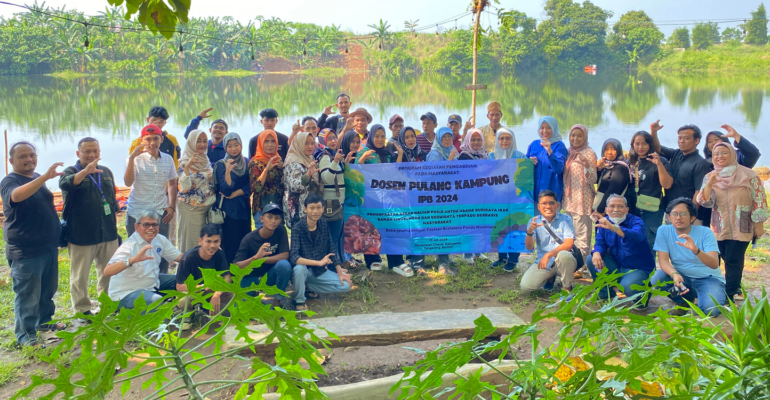Taking Advantage of the Used Lake of Sand Excavation, IPB Lecturer Develops Aquaculture and Fisheries System, Technology, and Management

IPB University Lecturer through the Dosen Pulang Kampung (Dospulkam) program organises training and exampling activities on the use of lakes used for freshwater fish farming efforts. The activity is located in Suradita Village, Cisauk District, Tangerang Regency, Banten.
Lecturers involved in the activity came from the Department of Aquaculture (BDP), Faculty of Fisheries and Marine Sciences (FPIK) of IPB University, namely Dr Irzal Effendi, Dr Yani Hadiroseyani, Dr Tatag Budiardi, Prof Iis Diatin, Dr Apriana Vinasyiam, and Belinda Astari, SPi, MSi.
In the Dospulkam activity, IPB University partnered with the Bratasena Pandu Nusantara Foundation which has utilised and managed a 2-hectare sand excavation lake for ecotourism activities.
This activity was started by the idea of a community leader Caswiyono R Cakrawangsa, a doctoral student at IPB University, to optimise the use of the lake for environmentally friendly fish farming businesses and community-based integrated ecotourism.
The training was attended by 30 fish cultivators who ran self-taught fish farming businesses from villages and sub-districts around the former sand excavation lakes, namely Suradita, Setu, Sampora, Dangdang, and Cibogo. The training was also attended by the Chairman of the Tangerang Regency Fisheries Office, the Subdistrict Chief of Cisauk, the Chief of Suradita Village, the Chairman of the Aquaculture Management Division of the Department of Aquaculture (BDP) IPB University.
The training materials provided include the introduction of ecological conditions and water quality of lakes used for sand excavation and fisheries cultivation production systems (seeding, cleaning, fish enlargement). Not only that, participants also get material about feed, water management in farming containers, fish health management, marketing, institutional and business analysis.
Dr Irzal Effendi as the president of the Dospulkam team in this region stated, “In this activity, IPB University lecturers will help develop the nile tilapia breeding business as the first step.”
Meanwhile, the Chairman of the Bratasena Pandu Nusantara Foundation, Aditya Firmansyah, SE expressed his gratitude that he could partner with IPB University. He hopes that later cooperation can be expanded in the field of agrotourism, small and medium business development (SMEs), and environmental management, especially in utilising lakes used for sand excavations.
The Secretary of Cisauk District, Muhammad Tarlan SSos, SIP in his speech said thank you and feel proud that IPB University can be present in the community to help create businesses and jobs as well as expand job opportunities.
The appreciation was also conveyed by the President of the Subdivision (Kasubag) of the Regional Technical Implementation Unit (UPTD) of Brackish Freshwater Aquaculture Fisheries Tangerang Regency Fisheries Office, Firman Nugraha, SPi. One of the participants said that the training given had added insight in trying to cultivate what he had been involved in.
Starting the exampling (demfarm) that will be given, the Dospulkam IPB University team has measured the quality of lake water as the basis for the development of utilisation for aquaculture. The pilot was given as a follow-up to the training, in the form of a system, technology, and management of nile tilapia seeding, both at water and on land.
“In the waters, we will develop a floating net karamba system, step net karamba and pen culture, while on land a tub or tank will be developed with a recirculation and flowthrough system that is sourced from lake water. The waste water from the system will be entered into the infiltration well to preserve the former sand excavation lake,” explained Dr Irzal. (*/Rz) (IAAS/Ard)



